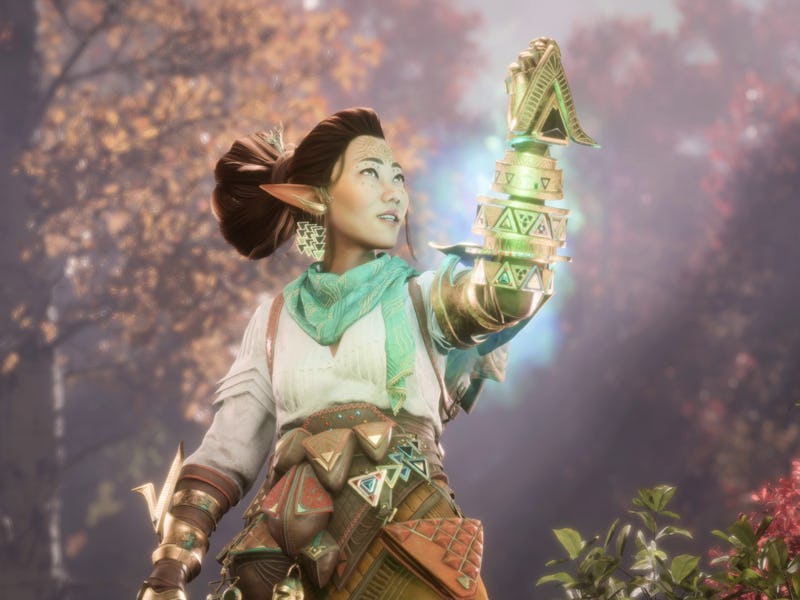No, Live Service Would Not Have Saved The Veilguard From EA
Not every problem can be solved with a battle pass.

Last year’s Dragon Age: The Veilguard emerged as a good but not great entry in the venerable RPG series after a famously troubled development. After publisher EA announced that the game had sold below its expectations, CEO Andrew Wilson said in the company’s most recent financial call that he knows what went wrong — it should have been a live-service game.
“In order to break out beyond the core audience, games need to directly connect to the evolving demands of players who increasingly seek shared world features and deeper engagement alongside high-quality narratives in this beloved category,” Wilson said.
EA’s CEO says The Veilguard would have been better off if it stayed a live-service game.
Now, you may have noticed that those sound like the words of a man who has no idea what he’s talking about. Buried in that tangle of a sentence is the message that The Veilguard should have shoved in some multiplayer live-service cruft if it really wanted to succeed. “Shared world features” implies some sort of persistent server to play together on, while “deeper engagement” is likely meant to refer to the typical grind of live-service daily quests and battle passes, when translated from Wilson’s corporate-speak.
It’s no wonder that EA’s executives would be quick to tout the superiority of live-service games over the single-play approach of The Veilguard.
“On a trailing 12-month basis, live services are 74% of our business,” Stuart Canfield, chief financial officer of EA said later in the call.
EA makes a lot of money from live-service games, but they’re not guaranteed successes.
That’s a massive slice of EA’s reported $2.2 billion in net bookings for last quarter, and by the logic of the executive class, indistinguishable as it is from the output of a malevolent AI, more live-service in more places means more money in their pockets.
Given how confident Wilson seems to be that The Veilguard would have been saved by injecting a bit of live-service magic to keep fans compulsively playing, it’s a bit surprising that no one thought of that during the game’s ten-year-long development cycle. Except, EA reportedly did exactly that at one point before reversing course and stripping the live-service component from the in-development game.
Back in 2017, an early version of Dragon Age 4 codenamed Joplin was scrapped by EA and BioWare specifically because there was no way to add a live-service component, as Kotaku reported. BioWare was working on Anthem at the time, and Joplin’s replacement was built using that soon-to-flop game’s code, intended from the start to include live service. After the failure of Anthem and the decision to cancel a planned re-launch, the publisher and developer then pivoted again, removing all vestiges of live service from the game that would eventually become The Veilguard in 2021.
The Veilguard underwent several massive shifts in its development, including a pivot to live service.
With live-service games like Concord and MultiVersus shutting down left and right, it seems extremely unlikely that continuing down that path would have turned The Veilguard into the money-printing machine EA would have liked. But the time to test that theory would have been some point during the game’s development, perhaps while those features were being actively implemented, rather than months after its release.
The more realistic takeaway is that The Veilguard was never going to meet EA’s expectations in the first place. The Veilguard released around the time that massive RPGs like Metaphor: ReFantazio were dropping, years into a significant downturn for the games industry, at a time when players have dwindling disposable income, and bearing little resemblance to the series fans had grown to love. There’s no reason to think it would be the smash hit EA says it expected, which is a good reminder that sales expectations are based much more on the whims and desires of executives than any form of sober data analysis.
Sure, there are plenty of things about The Veilguard that could have been improved, and it might have moved a few more copies if they had been. But this is a game that went through at least three distinct versions that we know of, all while facing constant changes in its development team and demands to fundamentally change its nature handed down by EA. For anyone to then declare that The Veilguard would be better off as an entirely different game, which was already attempted and then abandoned, is absurd. If your expectations are so constantly off the mark that entire studios need to be gutted for missing them, maybe it’s time to consider that the people setting those expectations are the problem.